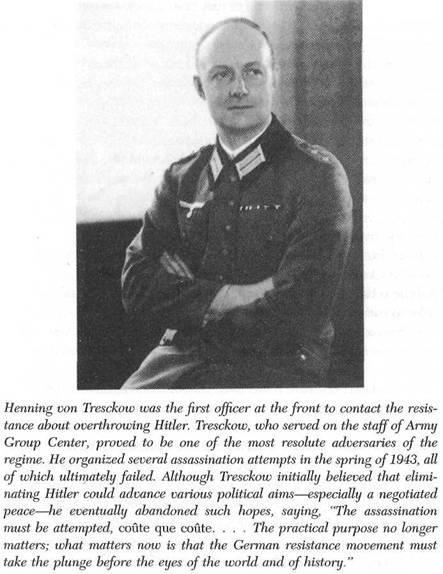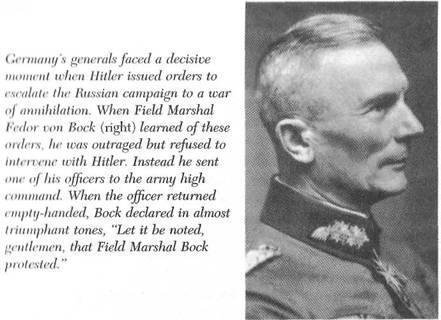Henning von Tresckow was the first general staff officer of Army Group Center, headquartered in Posen at the time. Those who were close to him all recalled the strong impression he made, his “leadership qualities,” “distinguished manner,” “sense of honor,” and “Prussianness.” These descriptions do more, however, to obscure his character than to illuminate it.

Next to Stauffenberg, he was the most remarkable figure in the military resistance, displaying not only the mental discipline and passionate moral sense of the other conspirators but also great coolness under pressure, decisiveness, and daring. The so-called Kaltenbrunner reports of the interrogations carried out after the July 20 assassination attempt describe him as the “prime mover” and the “evil spirt” behind the plot.6 Originally an admirer of National Socialism, Tresckow did not have to wait for Hitler’s blatant warmongering to see the error of his ways. The continual illegal acts, the persecution of minorities, the suppression of free speech, and the harassment of churches had long since turned him against the party. Unlike many others, he realized early on that the “excesses” of the Nazi regime were not excesses at all but its real nature. And with the same frankness with which he had once supported Hitler, he now began to criticize him. When one of his army comrades defended the regime, Tresckow vehemently disagreed and ended by predicting that a dispute like this could easily lead to their taking up arms on opposite sides some day. Indeed, the commander of the First Regiment of Foot Soldiers had once prophesied that young officer Tresckow would end up as either chief of general staff or a mutineer mounting the scaffold.7
At the time of the dispute over the western offensive, Tresckow attempted “in total despair” to organize a revolt. He urged his uncle Fedor von Bock, commander in chief of Army Group B, as well as Rundstedt and his chief of staff Erich von Manstein, to take action. But the generals “did not want to hear about any schemes directed against Hitler.” They were merely experts in military strategy, they replied, closing their minds to further persuasion. For the first time, Tresckow felt “contempt for the army leaders,” according to his biographer, Bodo Scheurig, and steeled himself to take matters into his own hands. But ironically, it was probably he who ensured that Brauchitsch and Halder did not scuttle Manstein’s “scythe-cut” strategy for penetrating deep into France with tanks and other armored vehicles, which later proved so successful. Tresckow’s former regimental comrade Rudolf Schmundt was now serving as Wehrmacht adjutant at Hitler’s headquarters, and Tresckow succeeded in persuading him to present Manstein’s plan to Hitler, who immediately saw its daring ingenuity and revised the invasion strategy.8
Tresckow’s own plans for a coup began to take shape after he was assigned to Posen and the preparations for war against the Soviet Union had begun in earnest. He systematically placed officers who shared his views on the army group general staff, eventually filling all the key positions. First, to the astonishment and probably also the chagrin of his colleagues, he hired the strictly “civilian-minded” lawyer and reserve lieutenant Fabian von Schlabrendorff. Tresckow valued Schlabrendorff’s prudence and judgment and made him his closest adviser. Tresckow also had General Staff Major Rudolph-Christoph von Gersdorff transferred from an infantry division. Gersdorff was a cavalry officer who, as Tresckow had discovered in the course of a chance encounter, agreed with him about the contemptible nature of the Nazi regime. Gersdorff combined rectitude with great presence of mind and courage, as well as a charmingly adroit manner. Tresckow also attracted two other majors, Count Carl-Hans Hardenberg and Berndt von Kleist, and Count Heinrich Lehndorff, a lieutenant, all of old Prussian stock. Eventually they were joined by Lieutenant Colonels Georg Schulze-Buttger and Alexander von Voss, First Lieutenant Eberhard von Breitenbuch, Georg and Philipp von Boeselager, and a number of others. It was later observed quite correctly that the largest and most tightly knit resistance group of those years could be found right on the general staff of Army Group Center.
When the edict on the application of military law and the Commissar Order arrived at Army Group Center, Tresckow immediately had the commander in chiefs plane prepared for takeoff and went, with Gersdorff, to see Bock. On a pathway through a small park leading to Bock’s villa, Tresckow suddenly stopped. “If we don’t convince the field marshal to fly to Hitler at once and have these orders canceled, the German people will be burdened with a guilt the world will not forget in a hundred years. This guilt will fall not only on Hitler, Himmler, Goring, and their comrades but on you and me, your wife and mine, your children and mine,” he said to Gersdorff. “Think about it.”9
Bock, who had attended the officers’ meeting on March 30, 1941, must therefore have been expecting these orders, but he expressed outrage upon receiving them, repeatedly exclaiming “Unbelievable!” and “Horrible!” during Gersdorff s summary of their contents. Nevertheless, he turned a cold shoulder to the suggestion that he immediately fly to Fuhrer headquarters with Gerd von Rundstedt and Wilhelm von Leeb, the commanders in chief of Army Groups South and North, and disavow obedience to Hitler. The Fuhrer, Bock said, would simply “throw him out” and possibly install Himmler in his place.Tresckow answered coldly that he could handle that.
After reflecting for a while Bock decided despite Tresckow’s constant objections to send Gersdorff to OKH (Army) headquarters in Berlin with the message that Field Marshal Bock vehemently protested the orders and demanded that they be rescinded at once. Since Brauchitsch was absent, Gersdorff met instead with General Eugen Muller, who informed him that the high command did not disagree with the army group. In fact Brauchitsch had already attempted on numerous occasions to have the orders canceled or at least amended. But each time, Hitler burst into a rage; during Brauchitsch’s last visit, he had even “hurled an inkwell” at him. “He won’t go see the Fuhrer anymore,” Muller concluded laconically. Returning to the army group that evening, Gersdorff found Bock dining with his chief of general staff, Hans von Greiffenberg, and Tresckow, Hardenberg, and Lehndorff. When Gersdorff reported the failure of his mission a deep hush descended. Then Bock, who was the first to regain his composure, remarked “almost triumphally”: “Let it be noted, gentlemen, that Field Marshal Bock protested.”10

Gersdorff later pointed out that if the commanders in chief of the army groups had jointly refused to obey Hitler, as Tresckow suggested, the Fuhrer would have been forced to yield. It would have been impossible to replace such key commanders just ten days before the start of the campaign. We also know through Gersdorff that all the senior officers, at least in Army Group Center, objected to the orders and did what they could to prevent their being carried out. Tresckow made some attempts to influence the other two army groups in this direction. Considerable controversy persists, however, as to the extent to which these and other such efforts were successful.
Tresckow realized, of course, that opposition from army commanders could do little to prevent the Einsatzgruppen from carrying out mass murders behind the front. Army Group Center could, however, bring some influence to bear. Arthur Nebe, the leader of Einsatzgruppe B in its area, had moved in opposition circles since 1938 and had only accepted his assignment after great emotional conflict and largely at the urging of Oster and Gisevius, who hoped that he would be able to supply the opposition with information from the innermost sanctums of power in the SS. Nebe hinted to Tresckow that he intended to report his missions completed when in fact they were not. Ultimately, Field Marshal Bock came to an agreement with Field Marshals Kluge and Weichs and General Guderian that it was “undesirable” for the orders to be carried out. In the spring of 1942, almost one year later, the Commissar Order was officially rescinded.11
Still, the army had hardly covered itself with glory. For the first time Hitler had tried to make it an accomplice in his crimes without receiving a clear refusal. Since the Rohm affair, the army had been careful not to allow itself to be drawn directly into criminal activities; at most, it exposed itself to accusations of standing aside and failing to help the victims. Now Hitler had succeeded on his first attempt in eliminating the distinction-still maintained in Poland up to this point-between military men engaged in traditional warfare and the murderousEinsatzgruppen. The one became caught up with the other in a war of annihilation that criminalized everyone who took up arms in the name of the German Reich. There could be no more talk of the sort that was common in the apologia written by former members of the Wehrmacht after the war, of having been “swept away” by events against one’s will and without sufficient knowledge. Hitler had without a doubt been encouraged to believe that he could get away with this final step by the supine resignation demonstrated by the generals over the years, their occasional outbursts of indignation not-withstanding.
This failure meant that the last opportunity of demonstrating to Hitler the limits to his power had been squandered. Brauchitsch would later claim that he sabotaged Hitler’s criminal orders by issuing special instructions stressing that a soldier’s primary duty was to fight and move on, not to engage in search-and-destroy operations. This strategy, however, amounted merely to a repetition of the failed tactic that the army had already practiced in

